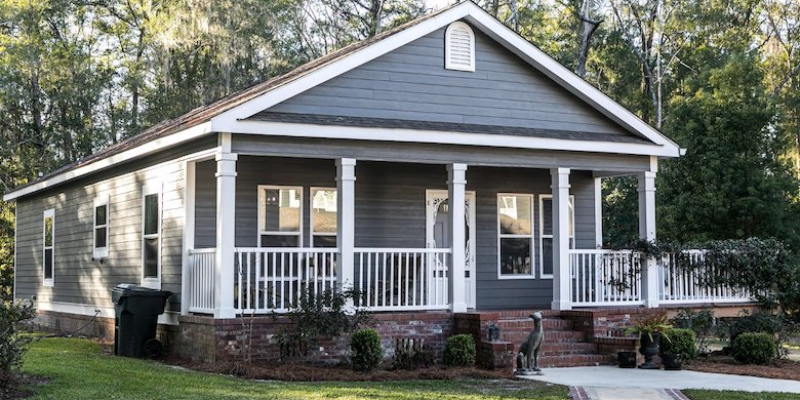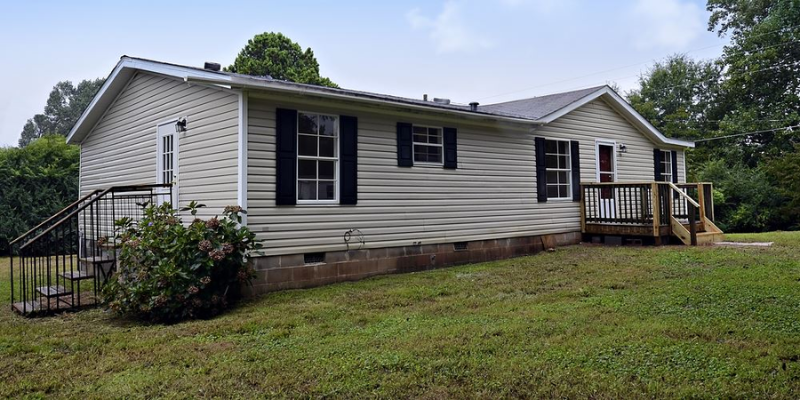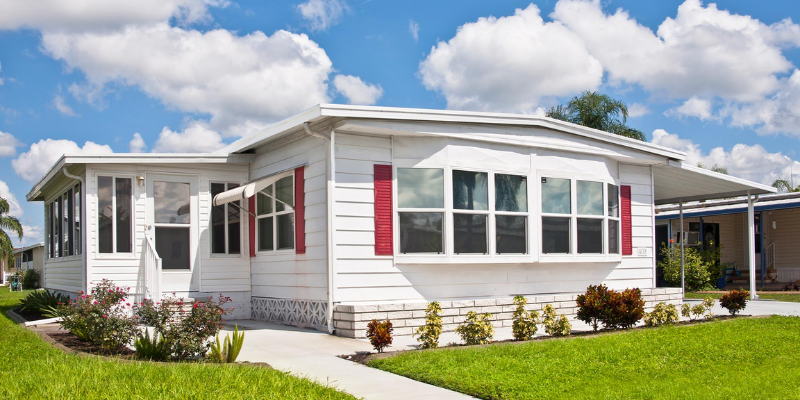In today’s dynamic financial landscape, homeowners are consistently seeking avenues to optimize their financial health, and for many, that journey includes exploring refinancing options. While traditional site-built homes often dominate discussions, a significant segment of the population resides in manufactured or mobile homes, presenting unique considerations for financing. If you’re looking to reduce your monthly obligations, secure a more favorable interest rate, or tap into your home’s equity, understanding which banks that will refinance mobile homes is a crucial step. Today, let’s join Goldnews24h to find out how to navigate this specialized refinancing process, providing you with the knowledge to make informed, data-driven decisions for your financial future.
Understanding Mobile Home Refinancing

Refinancing a mortgage involves replacing an existing loan with a new one, typically to secure better terms or extract equity. For owners of factory-built housing, this process comes with distinct characteristics compared to traditional real estate. It is essential to differentiate between “mobile homes,” which refers to factory-built homes constructed before June 15, 1976, and “manufactured homes,” which are built after this date and adhere to the stringent construction and safety standards set by the U.S. Department of Housing and Urban Development (HUD). Most lenders primarily offer refinancing options for manufactured homes that meet these modern standards, while modular homes, constructed in sections and assembled on a permanent foundation, are generally treated similarly to site-built homes for financing purposes.
What is mobile home refinancing
Mobile home refinancing essentially involves securing a new loan to pay off your current manufactured home mortgage. This can entail a rate-and-term refinance, aimed at achieving a lower interest rate or altering the loan’s duration, or a cash-out refinance, which allows you to borrow against your home’s equity. The specifics of what constitutes a “mobile home” in the eyes of a lender are critical, as homes built before June 15, 1976, often face more limited financing avenues due to differing regulatory standards. Modern manufactured homes, built to HUD code, typically have a broader range of refinancing possibilities due to their enhanced construction quality and safety features.
Why consider refinancing your mobile home
The motivations for refinancing a manufactured home are diverse, but they generally coalesce around improving your financial standing. A primary driver is the opportunity to lower your monthly mortgage payments, often achieved through securing a reduced interest rate or extending the loan’s repayment term. If current market rates are lower than your existing loan, refinancing can lead to substantial savings over the life of the loan. Another compelling reason is to access the equity you’ve built in your home. A cash-out refinance allows you to convert a portion of your home’s value into liquid funds, which can be strategically deployed for significant expenses such as home improvements, debt consolidation, or other financial needs. Furthermore, refinancing provides an opportunity to switch from an adjustable-rate mortgage (ARM) to a more predictable fixed-rate loan, offering stability in your monthly payments, a critical factor for long-term financial planning.
Key Factors Influencing Refinance Eligibility

Refinancing a manufactured home requires meeting specific criteria set by lenders and government programs, which often differ significantly from those for traditional stick-built homes. Both the characteristics of your property and your personal financial profile will undergo scrutiny during the application process. Understanding these prerequisites is essential to streamline your refinancing journey and enhance your chances of approval.
Property and home criteria
For a manufactured home to qualify for refinancing, it generally must meet several key structural and legal requirements. Crucially, the home must have been built after June 15, 1976, adhering to HUD’s construction and safety standards, which is typically evidenced by a HUD certification label and data plate. Lenders also require the home to be permanently affixed to a foundation and situated on land that you own, rather than leased property in a mobile home park. This ensures the home is classified as real property, a critical distinction.
Borrower qualifications
Beyond the property itself, your personal financial health plays a pivotal role in determining your eligibility for refinancing. Lenders will thoroughly assess your credit score, with minimum requirements typically ranging. A lower debt-to-income (DTI) ratio is also highly desirable, generally falling below 43% to 50%, as it indicates your ability to manage additional debt payments. Furthermore, demonstrating consistent income and sufficient assets through documentation like pay stubs, bank statements, and tax forms is crucial for proving your repayment capacity. For those considering a cash-out refinance, having adequate equity in your home is a prerequisite, as this is the basis for the additional funds you can borrow against.
Exploring Loan Options For Your Mobile Home

When seeking banks that will refinance mobile homes, it’s important to understand the various loan programs available, as each comes with its own set of eligibility criteria and benefits. These options cater to different financial situations and property types, offering pathways to more manageable payments, lower interest rates, or access to your home’s built-up equity. By examining the distinct features of government-backed and conventional loans, you can better align your refinancing strategy with your financial goals.
FHA loans for manufactured homes
FHA (Federal Housing Administration) loans are a popular option for refinancing manufactured homes, known for their more flexible eligibility requirements compared to conventional loans. These government-backed loans typically require a minimum credit score of 580 and may accommodate debt-to-income ratios as high as 57%, making them accessible to a wider range of borrowers. For existing FHA loan holders, the FHA Streamline Refinance program offers a simplified and faster process, often requiring minimal documentation and, in many cases, no new appraisal, provided the refinance offers a net tangible benefit like a lower interest rate. Additionally, FHA Cash-Out Refinance options allow homeowners to borrow up to 80% of their home’s appraised value, providing a viable way to access equity. Even for homes on leased land, FHA Title I loans might be an option, albeit with lower loan limits and primarily for home improvements.
VA loans for eligible veterans
For eligible service members, veterans, and surviving spouses, VA loans offer exceptional benefits when refinancing a manufactured home. These loans, backed by the U.S. Department of Veterans Affairs, often feature no down payment requirements, competitive interest rates, and the significant advantage of no private mortgage insurance (PMI). The VA Streamline Refinance, also known as an Interest Rate Reduction Refinance Loan (IRRRL), is designed for those with existing VA loans, allowing for a quicker process to lower interest rates without the need for a new appraisal or income verification in most scenarios. Furthermore, VA Cash-Out Refinance programs can enable qualified veterans to borrow up to 100% of their home’s value, offering substantial liquidity. However, the manufactured home must still be permanently affixed to a foundation, classified as real property, and meet VA and HUD standards to qualify for these favorable terms.
Conventional refinancing routes
Conventional loans, which are not government-backed, represent another avenue for refinancing a manufactured home, primarily suitable for borrowers with strong credit profiles. These loans typically demand a higher minimum credit score, often 620 or above, and a maximum debt-to-income ratio around 50%. While they may have stricter qualification criteria, conventional refinances can offer advantages such as potentially lower closing costs and the elimination of private mortgage insurance if you have at least 20% equity in your home. Programs like Fannie Mae’s MH Advantage and Freddie Mac’s ChoiceHOME are specifically designed for certain multi-width manufactured homes that meet enhanced construction standards, often allowing for more favorable terms. Cash-out options are also available through conventional loans, though restrictions on single-wide units might apply depending on the lender. It’s also worth noting that for homes not permanently affixed to land, alternatives like chattel loans or personal loans exist, though these generally come with higher interest rates and shorter repayment terms.
The Refinancing Process A Step By Step Guide
Embarking on the journey to refinance your manufactured home requires a methodical approach, much like any significant financial undertaking. By understanding each phase,, ensuring a smoother experience as you work with banks that will refinance mobile homes.
First, it is prudent to evaluate your current loan’s terms, including your interest rate, remaining balance, and the duration left on your mortgage. This initial assessment will help you determine the potential savings or benefits a refinance could offer. Simultaneously, obtain a copy of your credit report and review it for any inaccuracies, as a strong credit score is paramount for securing the most favorable new loan terms. Next, assessing your home’s current market value is critical, as lenders will require an appraisal to confirm its worth. This valuation directly impacts the amount you can borrow and your loan-to-value ratio.
Once you have a clear picture of your current financial and property standing, the next step involves thoroughly researching lenders who specialize in manufactured home financing. Not all financial institutions offer these specific loan products, so identifying those with expertise and a strong track record in this niche is essential. Prepare all necessary documentation, which typically includes proof of income, asset statements, identification, tax forms, and your home’s title documentation. This comprehensive preparation will significantly expedite your application.
After selecting a suitable lender and gathering all required paperwork, you will submit your loan application. Following this, your application enters the underwriting process, where the lender meticulously reviews your financial information and the property details to assess risk and finalize approval. The final stage is closing, which involves signing the new loan documents and paying any associated closing costs. These costs, typically ranging from 3% to 6% of the loan amount, cover various fees such as appraisals, title searches, and legal expenses. Being aware of these costs upfront is vital for an accurate assessment of your overall savings.
Identifying The Right Lender For Your Needs
Finding the appropriate financial institution when you’re looking for banks that will refinance mobile homes is a critical step that can significantly impact the terms and success of your refinancing endeavor. The market for manufactured home loans is specialized, and not all lenders possess the necessary expertise or offer competitive products in this segment. Therefore, a targeted approach to lender selection is highly advisable.
Prioritize lenders with a proven track record and extensive experience in financing manufactured homes. These specialized lenders often have a dee. While many conventional banks might primarily focus on site-built homes, some financial institutions have dedicated departments or specific programs tailored for manufactured housing.
It is imperative to meticulously compare offers. Some lenders may also offer streamlined refinance options or specific programs like Fannie Mae’s MH Advantage, which can provide added benefits. By diligently comparing and contrasting these elements, you empower yourself to choose a lender that genuinely aligns with your long-term financial objectives.
Common Pitfalls And How To Avoid Them
Navigating the refinancing landscape for manufactured homes can present several challenges that, if overlooked, could hinder your efforts or lead to less favorable outcomes. Being aware of these potential pitfalls is crucial for a smooth and successful refinancing experience with banks that will refinance mobile homes. A proactive and informed approach can help you sidestep common obstacles, ensuring your financial discipline translates into tangible benefits.
One significant challenge is the classification of your property. Many homeowners are unaware that manufactured homes must typically be legally reclassified from personal property (chattel) to real property to qualify for most conventional and government-backed mortgage refinancing programs. This reclassification often requires the home to be permanently affixed to a foundation and that you own the land it sits on. Failure to meet these foundation and land ownership requirements is a primary reason for refinance application denials.
Another common pitfall is underestimating or overlooking the closing costs associated with refinancing. These fees, which can range from 3% to 6% of the loan amount, can significantly impact the overall financial benefit of refinancing if not factored into your calculations. Always obtain a detailed closing disclosure. Interest rates for manufactured homes can be slightly higher than for site-built homes, making it even more critical to compare offers, homeowners of older mobile homes (those built before June 15, 1976) may face limited refinancing options due to outdated building codes, underscoring the importance of understanding your home’s specific vintage. Checking your existing loan for any prepayment penalties is also a smart move before committing to a new loan, ensuring that any savings.
Conclusion
Successfully navigating the process of identifying banks that will refinance mobile homes can unlock significant financial advantages,, and consult with financial professionals to secure a refinancing solution that aligns with your long-term wealth management goals, moving confidently towards greater financial freedom and stability.

